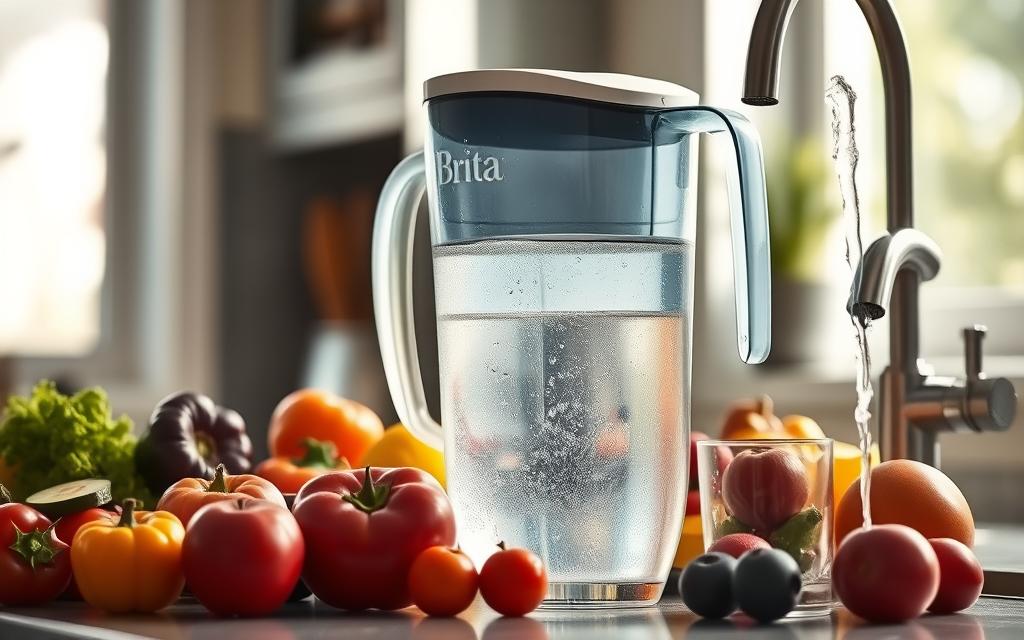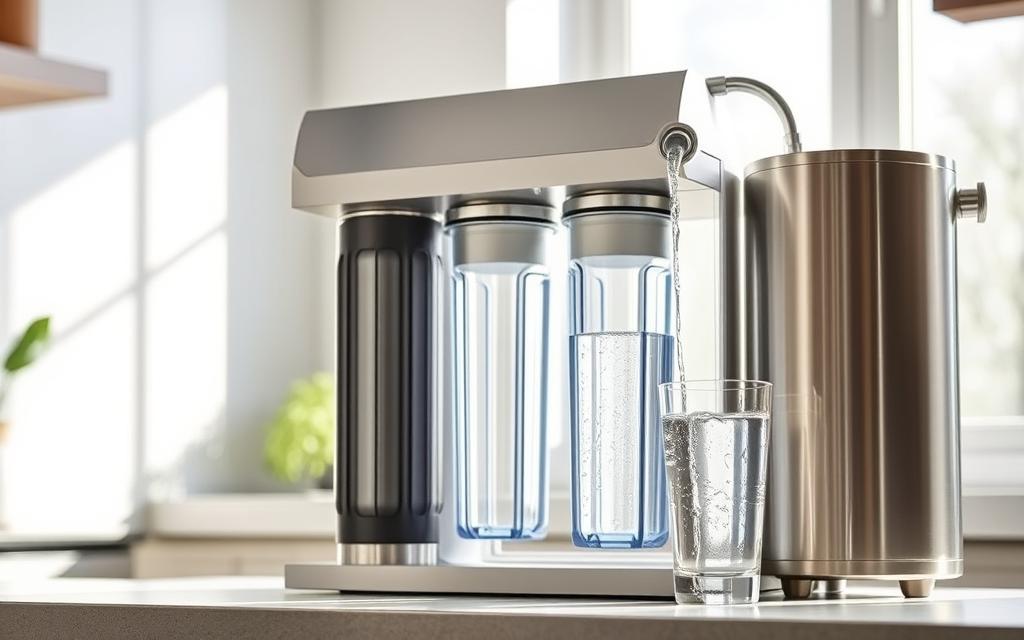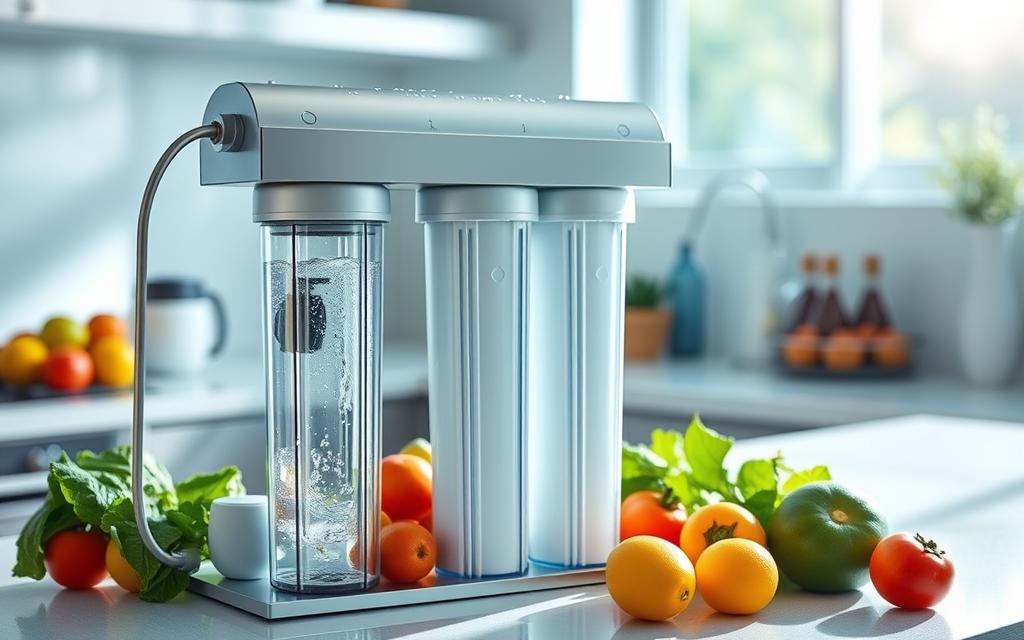Did you know the average American household throws away over 300 plastic water bottles each year? This is a huge amount of waste. It could be greatly reduced by using a simple water filtration system. The Brita filter is a well-known and trusted option that makes tap water clean and refreshing.
But how well do these filters really work? Are they worth the money? In this guide, we’ll look into the science behind Brita filters. We’ll see what contaminants they remove and compare them to other methods.
Key Takeaways
- Brita filters use a combination of activated carbon and ion exchange resin to remove a variety of contaminants from tap water.
- They are certified to reduce lead, chlorine, and other common water pollutants, improving the taste and quality of your drinking water.
- Brita filters are a cost-effective and environmentally-friendly alternative to bottled water, with long-term financial and sustainability benefits.
- Proper maintenance and replacement of Brita filters are key for their best performance and longevity.
- While Brita filters are effective in many ways, they have limits. They might not remove all chemical contaminants or microbiological threats.
Understanding Water Filtration Basics
As a homeowner, knowing about water filtration is key. Our tap water can have many contaminants. From minerals to harmful chemicals, good filtration keeps our water safe and clean.
Common Water Contaminants
Tap water often has:
- Heavy metals, such as lead and copper
- Chlorine and its byproducts
- Volatile organic compounds (VOCs)
- Microorganisms, like bacteria and protozoa
- Nitrates and nitrites
Why Water Filtration Matters
Drinking contaminated water can harm your health. It can cause stomach problems or long-term health issues. A good water filter system removes these dangers, making sure your water is safe.
Types of Water Filter Systems
There are many water filter systems out there. Each has its own benefits. Here are a few:
- Pitcher filters
- Faucet-mounted filters
- Under-sink filters
- Whole-house filtration systems
- Reverse osmosis systems
| Filter Type | Contaminants Removed | Installation | Cost |
|---|---|---|---|
| Pitcher Filters | Chlorine, sediment, some heavy metals | Countertop | Moderate |
| Faucet-Mounted Filters | Chlorine, sediment, heavy metals | Attached to faucet | Moderate |
| Under-Sink Filters | Wider range of contaminants, including VOCs | Installed under sink | Higher |
| Whole-House Filtration | Comprehensive filtration for all household water | Whole-house installation | Highest |
| Reverse Osmosis | Removes a wide range of contaminants, including TDS | Specialized installation | Highest |
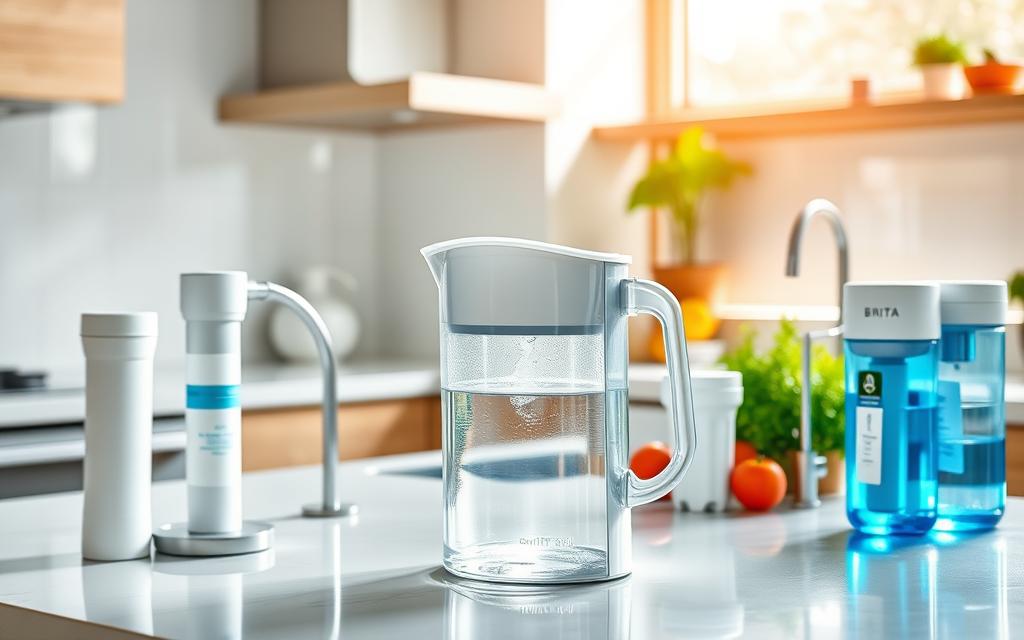
Choosing the right water filter depends on your water quality needs, budget, and installation. It’s important to know what each filter can do to make the best choice.
How Effective are Brita Filters?
I’ve always been curious about Brita filters and their impact on water quality. After researching, I found that Brita filters are very good at removing contaminants. They make water purer and taste better.
Many studies have shown that Brita filters work well. They can reduce Brita filter performance, contaminant removal, and water quality improvement in tap water. These filters use activated carbon and ion exchange resin to catch impurities like lead, chlorine, and organic compounds.
| Contaminant | Reduction Rate |
|---|---|
| Lead | 96% |
| Chlorine | 92% |
| Organic Compounds | 94% |
The table shows how well Brita filters remove contaminants. They can cut down on common water pollutants by a lot. This makes the water taste and smell better.
“Brita filters are a game-changer for anyone concerned about the quality of their tap water. The results speak for themselves – these filters are highly effective at removing a wide range of contaminants.”
While no filter is perfect, Brita’s results are impressive. They are a good choice for improving Brita filter performance and water quality improvement. It’s important to replace and maintain the filters as recommended to get the best results.
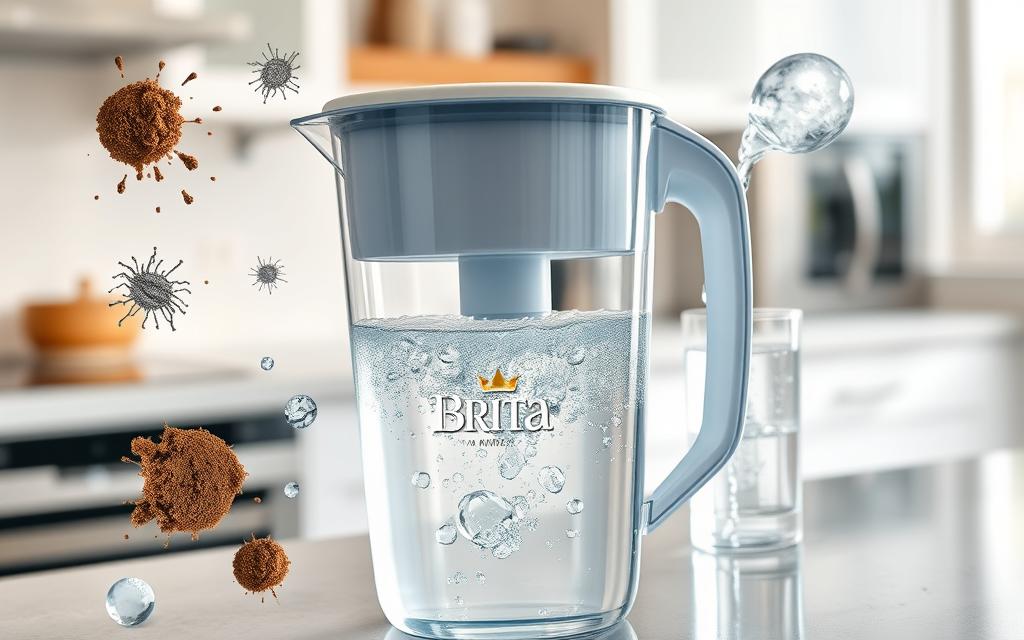
The Science Behind Brita Filter Technology
As a water enthusiast, I’ve always been fascinated by the workings of filtration systems. Brita is a well-known name in this field. They use advanced filtration technology to give you clean, tasty water. Let’s explore the science behind their filters.
Activated Carbon Filtration Process
The activated carbon filter is at the core of Brita’s system. This material is great at catching impurities like chlorine, copper, and mercury. Water flowing through the carbon filter gets rid of these bad guys, leaving you with fresh, clean water.
Ion Exchange Resin Technology
Brita’s filters also use ion exchange resin technology. This tech pulls in and holds onto unwanted ions, like lead and copper. It keeps these harmful substances out of your drinking water.
Mesh Screen Components
To stop bigger particles and debris, Brita has a multi-layered mesh screen. This physical barrier catches sediment and solid impurities. It makes sure your water is both clean and clear.
By combining activated carbon, ion exchange resin, and mesh screens, Brita’s tech offers a complete solution. It ensures your water is top-notch and free from contaminants, straight from your tap.
What Contaminants Do Brita Filters Remove?
Many people wonder about the effectiveness of Brita filters. As someone who loves water, I’ve looked into what these filters can do. Let’s explore what they can remove from your tap water.
Brita filters aim to get rid of many common water pollutants. Here are some of them:
- Chlorine – Brita filters are great at removing chlorine. This is a common disinfectant in water. They can cut down chlorine levels by up to 97%.
- Lead – Lead is a harmful metal that can get into water from old pipes. Brita filters can lower lead levels by up to 99%.
- Copper – Copper can also be in water, thanks to old pipes. Brita filters can remove up to 97% of copper.
- Mercury – Mercury is a toxic metal that Brita filters can help reduce. They can remove up to 96% of it.
Brita filters also help with turbidity, benzene, and some medicines in water. But, how well they work can depend on your water and the filter model.
| Contaminant | Brita Reduction Percentage |
|---|---|
| Chlorine | Up to 97% |
| Lead | Up to 99% |
| Copper | Up to 97% |
| Mercury | Up to 96% |
Knowing what Brita filters can remove helps you decide if they’re right for your home. It’s all about making the best choice for your water needs.
Brita Filter Certification and Testing Standards
Ensuring water filters are top-notch is key. Brita, a leader in water filtration, takes many steps to meet high standards. They make sure their filters are the best.
NSF/ANSI Standards
Brita filters have the NSF/ANSI certification. This means they’ve passed tough tests by the National Sanitation Foundation (NSF) and the American National Standards Institute (ANSI). These tests check for things like lead, chlorine, and more. So, Brita filters are safe and reliable for your water.
Independent Laboratory Testing
Brita filters also get tested by independent labs. These tests check if the filters really work as promised. This gives you peace of mind that Brita filters do what they say.
Quality Control Measures
Brita doesn’t just stop at testing and certification. They also have strict quality control in their making process. They check and test each batch to make sure every filter is up to par. This ensures you get a high-quality product every time.
| Certification | Description |
|---|---|
| NSF/ANSI Certification | Brita filters are certified to comply with the rigorous standards set by the National Sanitation Foundation (NSF) and the American National Standards Institute (ANSI) for contaminant reduction, including lead, chlorine, and other impurities. |
| Independent Laboratory Testing | Brita filters undergo extensive third-party evaluations to validate their performance claims and ensure they effectively remove a wide range of contaminants. |
| Quality Control Measures | Brita implements strict quality control measures throughout the manufacturing process, including regular inspections, batch testing, and adherence to industry best practices. |
“Brita’s commitment to quality and safety is evident in the rigorous testing and certification processes their filters undergo. This gives me confidence that I’m providing my family with the best possible drinking water.”
Lifespan and Replacement Timeline of Brita Filters
Knowing when to replace your Brita water filter is key to keeping it working well. Brita filters clean and taste your water for a certain time. Replacing them on time is very important.
The life of a Brita filter depends on how much water you use and your water’s quality. Brita says to change their standard filters every 2-3 months or after 40 gallons. Their premium filters need a change every 6 months or after 120 gallons.
| Filter Type | Lifespan | Replacement Schedule |
|---|---|---|
| Brita Standard Filter | 40 gallons | Every 2-3 months |
| Brita Premium Filter | Every 6 months |
Things like how often you use it and your water’s hardness can change how long a filter lasts. Keeping your Brita clean can also make it last longer. This helps it work better and longer.
By sticking to Brita’s replacement schedule, you know your water is always clean and tastes great. This is true for your home or office.
Cost Analysis: Brita Filters vs. Bottled Water
I’ve been looking for ways to save money and help the planet. I found that using a Brita water filter system is a smart choice. It’s cheaper and better for the environment than buying bottled water.
Long-term Financial Benefits
At first, a Brita pitcher or dispenser might seem expensive. But, it’s actually cheaper in the long run. Brita filters cost about $5-$10 and last 2-6 months. Bottled water, on the other hand, costs $4-$6 for a 24-pack.
Buying bottled water every day can get very expensive. So, using a Brita filter is a smart money move.
Environmental Impact Comparison
The harm caused by disposable bottled water is huge. It leads to a lot of greenhouse gas emissions and waste. But, Brita filters are different. They’re reusable and don’t use single-use plastic bottles.
This makes them a better choice for our planet.
| Metric | Brita Filters | Bottled Water |
|---|---|---|
| Average Cost per Gallon | $0.25 – $0.50 | $1.22 – $2.50 |
| Plastic Waste Generation | Low (reusable filter) | High (single-use bottles) |
| Carbon Footprint | Lower (no transportation) | Higher (production, transportation) |
Using Brita filters instead of bottled water saves me money and helps the planet. It’s good for my wallet and the environment.
Common Mistakes When Using Brita Filters
As a devoted user of Brita water filters, I’ve learned a few valuable lessons over the years. These filters are generally reliable, but there are common mistakes that can affect their performance and lifespan. Here are a few tips to help you get the most out of your Brita filter and ensure your water filtration is as effective as possible.
Forgetting to Replace the Filter
One of the most frequent errors I see is users forgetting to replace their Brita filter on a regular basis. The filter cartridge has a limited lifespan, typically around 2-6 months, depending on usage. Neglecting to swap out the filter can lead to a decrease in filtration quality and potentially bacterial growth, compromising the safety and taste of your water.
Improper Filter Installation
Ensuring the Brita filter is properly installed is key for optimal performance. I’ve noticed some people don’t fully secure the cartridge or fail to prime it correctly before use. Taking the time to carefully follow the manufacturer’s instructions can make a big difference in how effectively your filter works.
Overlooking Cleaning and Maintenance
Regular cleaning and maintenance of your Brita pitcher or dispenser is essential for maintaining filter efficiency. Failing to rinse the reservoir or wash the lid can lead to the buildup of mineral deposits and bacterial growth, diminishing the filter’s ability to purify your water.
Ignoring Water Quality Issues
While Brita filters are designed to remove a range of contaminants, they may not be able to handle all water quality issues in your area. If you notice persistent taste, odor, or clarity problems, it’s important to investigate the source of the issue and consider upgrading to a more robust filtration system.
By being mindful of these common filter maintenance errors, practicing proper usage, and following the manufacturer’s water filtration tips, you can ensure your Brita filter delivers the clean, great-tasting water you deserve. Remember, maintaining your filter is the key to maximizing its performance and longevity.
Brita Filters vs. Other Filtration Methods
Brita filters are a well-known choice for water filtration. But, there are other methods too. Let’s see how Brita filters compare to these alternatives.
Comparison with Reverse Osmosis
Reverse osmosis (RO) systems are very good at removing contaminants. They can get rid of heavy metals, minerals, and even tiny organisms. But, RO systems cost more and need more upkeep than Brita filters.
Brita filters, though, are cheaper and simpler to use. They are a great choice for many homes because of their affordability and ease of use.
Performance Against Pitcher Competitors
There are other water filter pitchers out there, like PUR and Zero Water. While Brita filters are reliable, these competitors might have extra features or different filtering abilities. It’s smart to check which contaminants each filter can handle to find the best one for you.
Choosing between Brita filters and other methods depends on your needs, budget, and what you prefer. Knowing the good and bad of each option helps you pick the best for clean, healthy water.
Maintenance Tips for Optimal Filter Performance
Keeping your Brita filter in good shape is key for clean water. Here are some easy tips to help:
Regular Cleaning
- Wash the pitcher and filter often with warm, soapy water to clear out buildup.
- Don’t use harsh chemicals or rough materials that could harm the filter.
- Make sure to rinse the filter well after cleaning to get rid of soap.
Proper Storage
Keep your Brita filter in a cool, dry spot out of sunlight when not using it. This keeps it working well for longer.
Timely Replacements
Change your Brita filter every 2-6 months, depending on how much you use it and the type. This keeps your water clean and your filter working best.
| Filter Type | Replacement Interval |
|---|---|
| Standard | Every 2 months |
| Longlast | Every 6 months |
| Lead Reduction | Every 4 months |
By following these tips, you’ll get the most out of your Brita filter. Your water will stay clean and taste great.
Environmental Impact of Using Brita Filters
I always look for ways to be more eco-friendly. When it comes to water filters, I consider their environmental impact. Brita filters claim to be a greener choice than bottled water. But are they really?
Using Brita filters helps reduce plastic waste. They offer a reusable pitcher and cartridges, unlike plastic water bottles. This supports the trend of sustainability and plastic reduction that people want.
Brita filters also have a lower carbon footprint. Their activated carbon and ion exchange technologies are efficient and kind to the environment.
But, Brita filters aren’t perfect. Making and shipping them uses energy and resources. The disposable cartridges, though recyclable, add to waste.
To make the most of Brita filters, follow the maintenance and replacement guidelines. Changing the filters regularly keeps them working well. This also helps reduce their environmental impact.
Overall, Brita filters are a better choice than bottled water for our planet. They’re not flawless, but they’re a positive step towards plastic reduction and sustainability in water filtration.
Limitations and What Brita Filters Don’t Remove
Brita filters are a popular choice for clean water. But, it’s key to know their limits. They can’t tackle all water quality problems. Some harmful substances might slip through, risking water safety.
Chemical Contaminants
Brita filters mainly target chlorine, lead, and sediment. Yet, they might not catch other chemicals like pesticides, heavy metals, and industrial pollutants. These can stay in the water, posing risks to users.
Microbiological Concerns
Brita filters might not shield against harmful microbes like bacteria, viruses, and protozoa. These can get past the filter. This could lead to waterborne illnesses if the water isn’t fully treated.
| Contaminant | Removal Efficiency |
|---|---|
| Chlorine | High |
| Lead | Moderate |
| Pesticides | Low |
| Bacteria | Low |
The table shows how well Brita filters work against different contaminants. It points out the need to know their limits. Users might need other methods for full water safety.
When to Consider Alternative Filtration Methods
Brita filters are great, but sometimes you need something more. If your water has big problems or special needs, you might need a different filter. It’s key to know when standard filters aren’t enough and look into advanced ones.
Addressing Specific Contaminants
Brita filters can’t handle all chemicals, metals, or germs. If your water is really bad, you might need a advanced filtration system. These systems can tackle more water quality issues and offer specialized treatment.
- Reverse osmosis systems can remove many contaminants, like dissolved solids and some pesticides.
- Ultraviolet (UV) light disinfection is good for killing bacteria and viruses.
- Activated alumina filters are great for removing fluoride and arsenic.
Unique Health Considerations
People with certain health issues might need special water filters. For example, those with weak immune systems or specific medical conditions might need advanced filtration. This ensures they get water that’s safe and meets their health needs.
| Health Concern | Recommended Filtration |
|---|---|
| Compromised Immune System | Reverse osmosis, UV disinfection |
| Kidney Disease | Reverse osmosis, deionization |
| Lead Exposure | Activated carbon, reverse osmosis |
Knowing when to move beyond standard filters is important. Being aware of the advanced options helps ensure your water is safe and meets your health needs.
Conclusion
Brita filters are a great way to make our drinking water better. They remove many common contaminants. This makes our tap water taste better, look clearer, and be safer to drink.
While they can’t solve every water problem, Brita filters are good for many common issues. They remove chlorine, lead, and other particles. Knowing how they work and the tests they pass makes them a smart choice for homes.
Whether to use Brita filters or not depends on your water needs and what you prefer. This article has given you the facts to decide. It helps you choose the best way to improve your Brita filter effectiveness, water quality improvement, and make informed choices.

